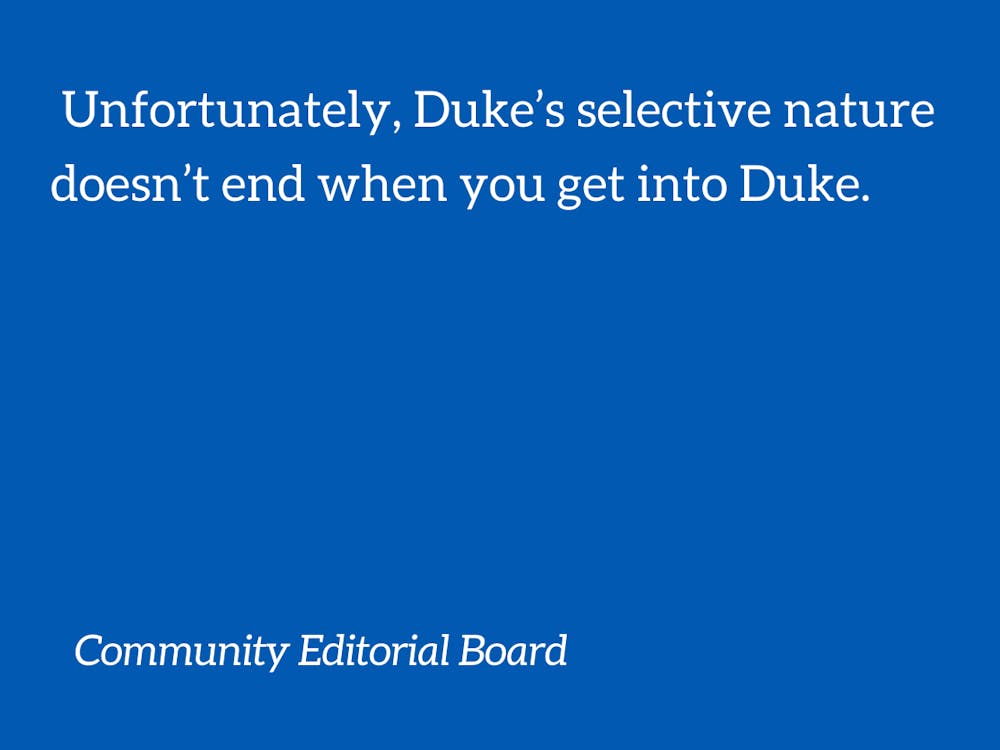Getting into Duke is no easy task. With an overall acceptance rate of 5.8% for the Class of 2025, it’s quite an exclusive process. Unfortunately, Duke’s selective nature doesn’t end when you get into Duke. Social life on campus holds its own share of statistics. One third of students are involved with Greek Life, another third are active in selected living groups or living learning communities and the last third of students are considered independent – not a part of either social outlet. But what exactly do these statistics mean, and how do they translate to the social scene on a Friday night?
The disjointed social life at Duke begins the moment a student moves to East campus for their freshman year. The first-year experience promotes this divide. Residing on a campus nearly two miles away from the rest of the student body, first-years are physically separated from upperclass students. This “barrier” automatically decreases the chance of first years interacting with older students. For newbie freshmen, upperclass students can help integrate them into the campus community and different aspects of Duke’s social life. However, many freshmen don’t have connections with upperclassmen coming into Duke. A select group of lucky ones may have an older sibling or friends from their hometown with whom to fraternize, but this is not the case for the vast majority of Dukees. Additionally, the many freshman-oriented classes such as first-year seminars, Writing 101 and FOCUS courses limit their ability to meet upperclassmen through classes.
Greek life and selective clubs, like Scale and Coin, further exacerbate social divides. On the surface, they provide students with the opportunity to socialize with like-minded peers through Greek-organized or club-organized events. Of course, Greek life is exclusive by definition, but the way this exclusivity manifests can be problematic in and of itself. Membership dues can be expensive – upwards of thousands of dollars per semester. Furthermore, the selection process and participation often require special clothing that can also be cost-prohibitive. Duke’s student body has a wide range of socioeconomic classes; thus, not all students are able to afford the hefty price tags of participation. Duke’s Office of Financial Aid sure isn’t covering these costs in their financial aid packages. These factors create a selective group of primarily affluent students who participate in this aspect of social life at Duke.
Duke basketball constitutes another example of exclusive social life. The Duke basketball program is nationally renowned. In the admissions process, the university advertises these sporting games as community events that are integral to the Duke experience; what they don’t mention is that not all students can partake. In reality, attending basketball games is something that only a relatively small proportion of students can make a part of their Duke experience. While the tenting process may seem like a meritocracy — those who put in the effort get the best seats — there are a number of external factors that affect who can make it through the tenting season. Students with jobs or small social circles may not succeed in the process. On the other hand, students in Greek life have an advantage in tenting due to the size of their fraternities and sororities. Further, students who have parents with Iron Duke status may not need to tent at all. Tickets are often only purchasable by those who are economically advantaged because resale prices are exorbitant.
Duke’s community of students is an aspect that sets the university apart from other institutions. The student body consists of individuals from varied racial, ethnic, religious, socioeconomic and international backgrounds. Thus, there is significant potential to interact with a diverse range of students and perspectives on campus. However, due to many of the social barriers described, this potential is stunted. The infrastructure of Duke’s social life confines students to restrictive social circles by limiting the number of people that they meet during their four years as undergraduates. In this way, restricting these social circles prevents students from experiencing one of the central aspects that makes Duke so special. The four years of college should be life-changing and different in exposing students to such a diverse subset of people; this is an aspect of college that Duke students should not have to compromise.
Duke already makes significant efforts to host fun campus-wide events, and many of the student-run clubs and organizations do as well. There are, however, solutions that individuals can take to increase their exposure to a wider subset of Duke’s community and combat this exclusivity. For instance, students can actively seek research positions by directly contacting professors instead of applying to exclusive programs such as Muser. Furthermore, if students don’t get into the club or group that they wanted, another solution would be to start their own. This can apply to a wide range of groups – there can never be too many a cappella groups! Perhaps the university could also sponsor more activities and parties for first-years to attend on Friday or Saturday nights. For upper-class students, this could mean turning QuadEx into a positive social experience for students; each Quad could have their own traditional events, and events could rotate from month to month in each of the different Quads. In this way, students from other Quads could attend and look forward to each other's social gatherings each year. First-years can be included to attend their future QuadEx as well. This is how true community is established.
The Community Editorial Board is independent from the editorial staff of the Chronicle. Their column typically runs on alternate Tuesdays.
Get The Chronicle straight to your inbox
Signup for our weekly newsletter. Cancel at any time.

